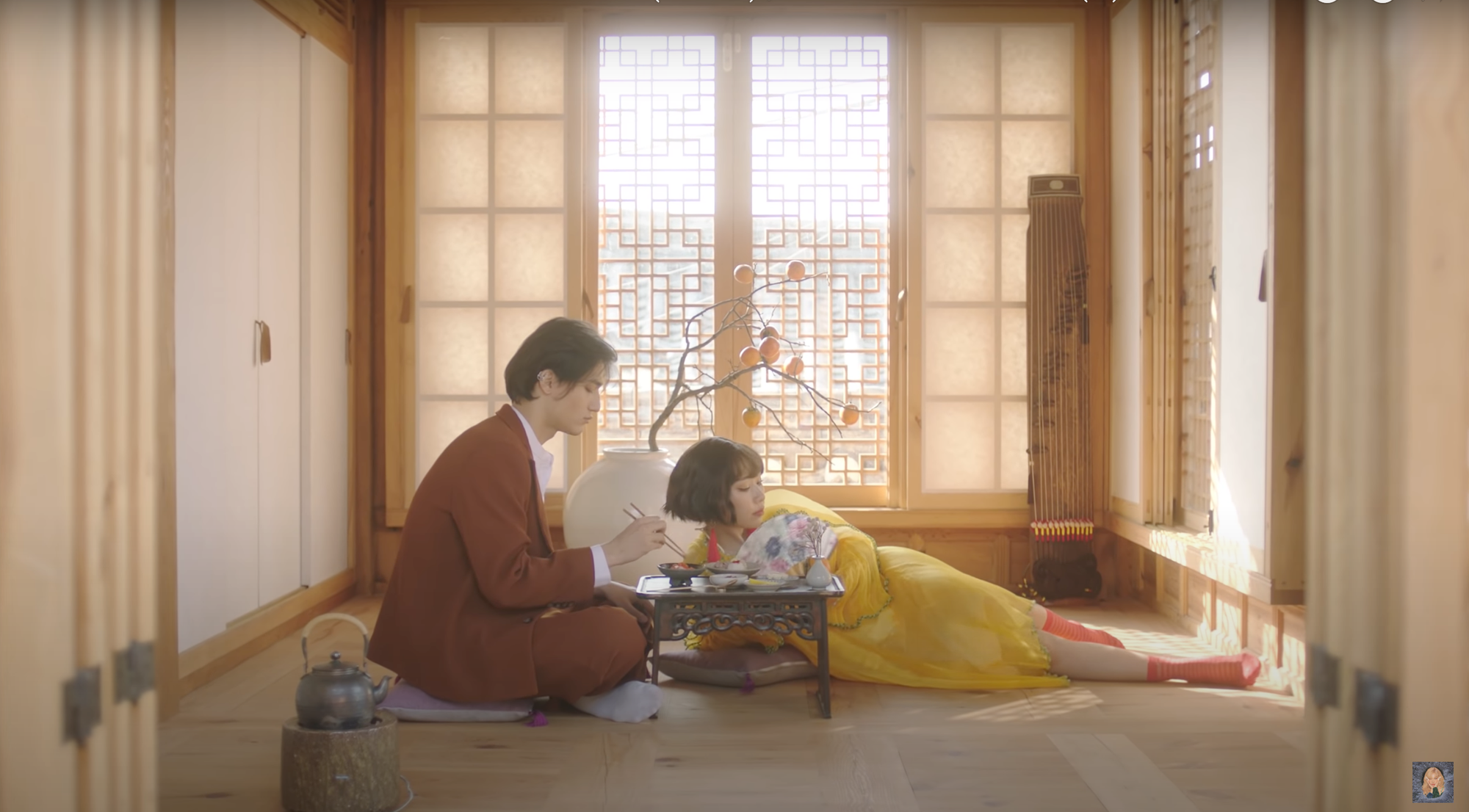Because Love Keeps Stabbing
"Because Love Keeps Stabbing" is the first essay of Embedded, a series of writings on the moving image. Artists, musicians, and writers choose a piece of media––embeddable on a web page––and elaborate on why it has lodged itself in their psyche.
There’s a Vietnamese pop star who shares my name, Minh Nguyen, though she goes by Min. We were born five days apart––her in Hanoi, me in Ho Chi Minh City, her into wealth, me not. She moved to Germany and then back to Vietnam; I moved to the US, where I still reside with discontent! Min is pale with surgically-enhanced features––round coquettish eyes, a slim angular nose, a jawline like a heart. Like most pop stars she is always shapeshifting, rotating between not just looks but archetypes. Once she was a demure coed who lyricized her diary entries, these days a woman who wears past heartbreaks like badges. Sometimes her hair is long and blonde, sometimes a neat bob with bangs. Her beauty is so uncontroversial, so mollifying, so nondescript, that I’m not sure I would recognize her if we passed each other in the mall.
The first song I heard of hers, and the one that I've listened to most, is “Vì Yêu Cứ Đâm Đầu,” featuring Vietnamese pop stars JustaTee and Den Vau. The title is an adage that translates to the ill-advised things one does for love, but I like to vulgarly interpret it as “Because Love Keeps Stabbing.” The song has a simple rhythm with a soaring chorus, catchy and winsome like Min. The lyrics express a mutual love that seems present, yet a shadow of dread lurks over it. “How long will it last,” she ponders, “just want to roam around with you to the ends of the earth.” How long will what last? The relationship? Their lives? This epoch? Den Vau raps in a sing-song staccato, his sharp Northern Vietnamese accent glinting like sunlight on metal. Pop’s melodic pleasure trumps language, you don’t need to understand the lyrics to enjoy it. “Love From India,” the YouTube comments chime, “Greetings from Brazil.”
How can I describe the feeling of watching Min? It’s intriguing and unnerving. Maybe a little perverse. She’s a bizarro me, we’re like mirror selves––versions of what Minhs born in our time could become. She feels familiar and not familiar at all. Why did she decide on just Min? The mononame is a celebrity move, and the changed spelling of Minh, one of the most common Vietnamese names, suggests a reach for international appeal. Min is not a Vietnamese name, but it is a Korean name (閔).
Maybe her agency, St. 319 Entertainment, changed her name. The Hanoi-based company was formed by pop dancers Aiden and Zoie, to specialize in releasing K-pop-style V-pop. Min was one of St. 319’s debuting stars. St. 319 replicated the K-pop model, the development of which is largely attributed to Soo-man Lee, founder of SM Entertainment, the Seoul-based agency behind stars like BoA and Girls’ Generation. Lee was born in Jeonju during the Korean War and moved to the US to study engineering. Struck by the then-newly-launched MTV, Lee started SM in 1989 as an operation of what he would call “cultural technology”––to combat the dominance of US pop culture in South Korea and recast the nation’s image into a cosmopolitan one. SM wrote a literal blueprint for K-pop: the legendary employee manual breaks down stardom into a formula, like, as an article puts it, “what chord progressions to use in what country… the precise color of eyeshadow a performer should wear… the exact hand gestures she should make.” Since the 2000s, K-pop stars have achieved unprecedented global reach, becoming key to the nation’s wielding of “soft power” (called hallyu, or “Korean Wave”) as a diplomatic strategy. Middle schoolers everywhere now may adore Min like I once adored BoA. I loved her song “Amazing Kiss,” which puts glittering sound to the stomach-dropping rush of crushing. I looped it endlessly on my Winamp player. I was spellbound by her beauty. She made me, at fifteen, want to be Korean.

Where on earth are they?
Still from Min (feat. Đen, JustaTee) - Vì Yêu Cứ Đâm Đầu. Courtesy of Believe Music.

In the US, hallyu lands into a saturated market, becomes another item on the menu of lifestyles, as types of skincare, food, fashion, etcetera. In Vietnam, where recent political history forestalled development of commercial enterprises, hallyu penetrates with psychic force. “You look Korean beautiful” is a common compliment, on the streets and on network television. The word KOREAN on advertising banners that drape across surgery centers flash as a national identity crisis. Min compounds this for me: I see her and see the Korean media that has been streaming out of Vietnamese television for three decades. (In Southeast Asia, hallyu hit Ho Chi Minh City first, through a broadcasted K-drama in 1998.) These cultural imports are part of a larger entanglement. As of 2014, South Korea has become the biggest foreign investor in Vietnam’s economy, and its third-largest trading partner, after China and the US. Economists call the two nations’ relationship “the Pacific miracle.” Vietnam’s former Deputy Prime Minister Vu Khoan described it as “an endless line of water that starts from a shallow stream, grows into a big river, and then flows into the ocean.” Couldn’t those lines be Min lyrics?
Those advertised surgeries don’t promise Korean features but Anglicized ones popular in Korea: slim nose, big eyes, features like Min’s. It’s not really about becoming Korean as it is aligning with the aesthetics of power. These aesthetics are ever-shifting, as seen by the ethnic signifiers that swirl errantly in the “Because Love Keeps Stabbing” video: Min and her love interest are in a Japanese wooden house with paper windows and tatami mat floors. Yellow forsythia branches jut from ceramic vases. A 16-string zither (a traditional Vietnamese instrument) leans against the wall. In one scene, Min reclines in a gauzy yellow dress with red trimmings (colors of the Vietnamese flag), holding a Chinese folding fan. In another scene, they play mahjong. They’re lounging in some sort of East Asian fantasy tableau, pleading the case that Vietnam belongs in that fantasy too. Min is recalibrating, like an algorithm, figuring out the perfect formula. Her willingness to adapt is not unlike romantic devotion. She can be anything you want.
When I look at Min I look at a distorted mirror. Our lives refract the glares of power that dominate our shared birthplace. In Asia as Method, the theorist Kuan-Hsing Chen puts it this way: a nation that has endured many phases of colonization produces multiple national subjects. On the one hand, the emergence of multiple subjects challenges “a unifying imperialization”; on the other, “such a challenge forces the emerging subject groups to shoulder the pressure of intense confrontation.” Min and I embody this confrontation––she feels both akin and adversarial. She’s infiltrated, and I am confronted with my own infiltrations. Pop music is a realm where unrealizable dreams flourish, are dramatized, are inflated to bursting point. In “Because Love Keeps Stabbing,” the collective aching dream of recognition is shrink-fitted into two lovers. Min sings, “here’s to a more intoxicating love.” Maybe what she’s hymning is the inebriation of desire––the desire to be adored… to become powerful through adoration… to survive. ♦
Subscribe to Broadcast